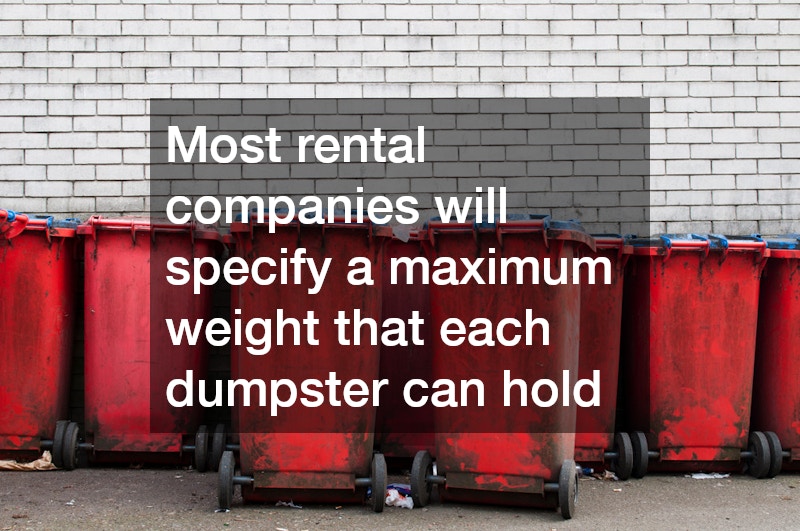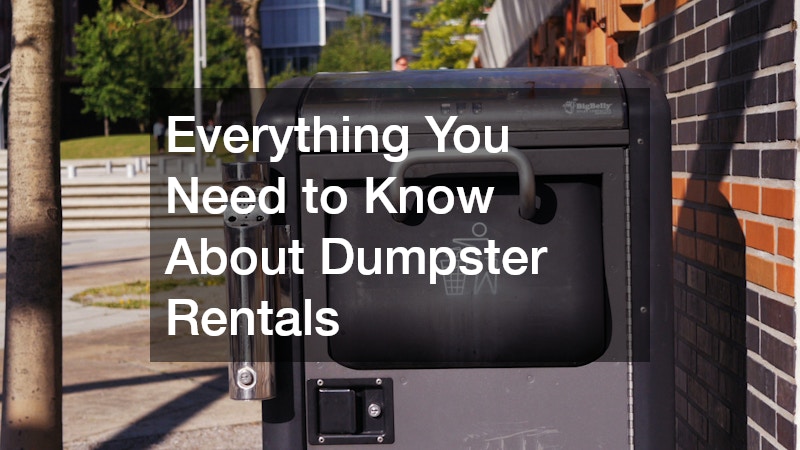In today’s world, efficient waste management is vital for both residential and commercial properties. One of the most effective solutions for managing large amounts of waste is through dumpster rentals. Read on to learn everything you need to know about dumpster rentals, addressing common questions and providing tips for making the most out of this service.
What Size Dumpster Do You Need for Your Project?
Choosing the right size dumpster can be crucial for your project to ensure you have enough space for your waste. Various sizes accommodate different types of projects, from small home cleanouts to large construction jobs. The common sizes range from 10-yard dumpsters suitable for smaller jobs, up to 40-yard containers that can handle substantial renovation or construction waste. It’s important to assess the volume of debris you expect to generate, as overfilling a dumpster or opting for too small a size can lead to increased costs and delays in your project’s timeline.
In addition to the physical size, it’s also essential to consider the weight limits associated with each dumpster size. Most rental companies will specify a maximum weight that each dumpster can hold, which relates to both safety regulations and disposal costs. Exceeding this weight limit can result in additional fees or even fines. Therefore, understanding your project’s specific needs will help guide you to the right dumpster rental size. Furthermore, think about the type of materials you will be disposing of, as heavier materials like concrete and dirt will fill up a dumpster more quickly than lighter items like wood or cardboard.
Ultimately, to make an informed decision about the appropriate dumpster size, consider consulting with the rental company. They can assess your project type and volume more accurately and help direct you toward the most suitable option. Keep in mind that a dumpster that is too large might not only be an extra expense but could also take up more space than necessary, which can be a concern in tight residential areas.
What Can and Can’t Be Placed in a Dumpster?
Not all waste is suitable for dumpster disposal. It’s essential to know what items are allowed and what are considered hazardous materials that require special handling. Typical items that can go in a dumpster include household debris, construction materials, yard waste, and general clutter. However, each rental company will have its own specific guidelines, so it’s important to clarify what you can and cannot dispose of in your rented dumpster.
Hazardous materials—including batteries, chemicals, oil, and any kind of medical waste—must be disposed of separately as they can pose significant safety risks and environmental concerns. Many areas have strict regulations regarding the disposal of hazardous materials, and violating these can lead to hefty fines. Therefore, it is crucial to identify any hazardous waste ahead of time and find appropriate disposal options before your dumpster rental begins.
Understanding local regulations is key to avoiding complications during your rental period. Many municipalities may require separate disposal sites for certain items, and your rental company might offer guidance on best practices. Make sure to ask the dumpster rental company about any limitations and recommendations regarding waste disposal to avoid any misunderstandings during your rental time.
How Long Can You Rent a Dumpster?
The rental duration can vary depending on the rental company and your specific needs. Some companies may offer affordable daily rates for short-term projects, while others provide discounts for extended rental periods. Generally, rental durations can range anywhere from a single day to several weeks, depending on your project’s scale and timeline. Assessing your project efficiently will help determine the length of time needed.
Keep in mind that if you find that you need the dumpster for a longer period than initially planned, many rental companies allow for extensions. However, extra fees may apply, and it’s best to confirm these details ahead of time. Don’t hesitate to communicate with your rental company regarding your timeline needs, and they may be able to offer suitable arrangements that can reduce costs.
Ultimately, transparent communication with your dumpster rental provider can help ensure a hassle-free experience. Always confirm your timelines upfront to avoid any surprises later on and make planning your waste disposal efforts much easier.
How Do You Prepare for a Dumpster Rental?
Preparing for a dumpster rental involves knowing where to place the dumpster, ensuring accessibility for the delivery truck, and understanding local regulations regarding placement and permits. Consider an optimal location that is readily accessible and does not block any driveways, walkways, or other critical areas. Be mindful of overhead obstacles such as low-hanging branches or power lines that may impede access.
Before delivery, check if a permit is required from your local municipality for placing a dumpster on public land or the street. Some cities enforce strict guidelines regarding dumpster placement and may require you to apply for a permit beforehand. Failing to comply with these regulations can lead to fines or penalties, so it’s wise to verify beforehand.
Additionally, ensure that the area is clean and clear of any obstacles before the dumpster arrives. A clutter-free space will make it easier for the delivery driver to position the dumpster accurately and efficiently. Being proactive in these preparations will help ensure a smooth rental experience and avoid any unnecessary delays in your project.
Dumpster rentals can be an invaluable resource for managing waste effectively, whether for a DIY project, renovation, or cleanout. By understanding the key aspects discussed in this article, you can make informed decisions that will streamline your waste management process. Awareness of sizes, regulations, and preparation practices is key to a successful dumpster rental experience. Taking the time to research, plan, and communicate your needs with the rental company will not only save you money but also significantly improve the efficiency of your project.




